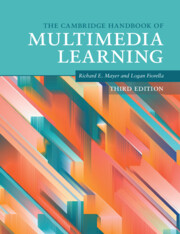Book contents
- The Cambridge Handbook of Multimedia Learning
- The Cambridge Handbook of Multimedia Learning
- Copyright page
- Contents
- Figures
- Tables
- Contributors
- Preface
- Acknowledgments
- Part I Background
- Part II Theoretical Foundations
- Part III Basic Principles of Multimedia Learning
- Part IV Principles for Reducing Extraneous Processing in Multimedia Learning
- Part V Principles for Managing Essential Processing in Multimedia Learning
- Part VI Principles Based on Social and Affective Features of Multimedia Learning
- Part VII Principles Based on Generative Activity in Multimedia Learning
- Part VIII Multimedia Learning with Media
- 37 Multimedia Learning with Cognitive Tutors
- 38 Multimedia Learning with Animated Pedagogical Agents
- 39 Multimedia Learning with Simulations
- 40 Multimedia Learning with Computer Games
- 41 Multimedia Learning with Instructional Video
- 42 Multimedia Learning in Virtual and Mixed Reality
- 43 Multimedia Learning with Visual Displays
- 44 Multimedia Learning from Multiple Documents
- 45 Multimedia Learning in e-Courses
- 46 Principles for Educational Assessment with Multimedia
- Author Index
- Subject Index
- References
38 - Multimedia Learning with Animated Pedagogical Agents
from Part VIII - Multimedia Learning with Media
Published online by Cambridge University Press: 19 November 2021
- The Cambridge Handbook of Multimedia Learning
- The Cambridge Handbook of Multimedia Learning
- Copyright page
- Contents
- Figures
- Tables
- Contributors
- Preface
- Acknowledgments
- Part I Background
- Part II Theoretical Foundations
- Part III Basic Principles of Multimedia Learning
- Part IV Principles for Reducing Extraneous Processing in Multimedia Learning
- Part V Principles for Managing Essential Processing in Multimedia Learning
- Part VI Principles Based on Social and Affective Features of Multimedia Learning
- Part VII Principles Based on Generative Activity in Multimedia Learning
- Part VIII Multimedia Learning with Media
- 37 Multimedia Learning with Cognitive Tutors
- 38 Multimedia Learning with Animated Pedagogical Agents
- 39 Multimedia Learning with Simulations
- 40 Multimedia Learning with Computer Games
- 41 Multimedia Learning with Instructional Video
- 42 Multimedia Learning in Virtual and Mixed Reality
- 43 Multimedia Learning with Visual Displays
- 44 Multimedia Learning from Multiple Documents
- 45 Multimedia Learning in e-Courses
- 46 Principles for Educational Assessment with Multimedia
- Author Index
- Subject Index
- References
Summary
A pedagogical agent (PA) is a computerized humanlike onscreen image whose purpose is to guide the learner’s attention and facilitate learning. In this chapter, the main findings from research on pedagogical agents are reviewed and a meta-analysis is used to reveal the specific role of PAs on learning outcomes, yielding an effect size of g = .45 on transfer performance and g = .23 on retention performance. We also examine explanations for why PAs could have a positive effect on learning performance based on social agency theory, the embodiment principle, and the signaling principle. In addition, this chapter summarizes the main moderating variables for the effect of PAs, including characteristics of the learner such as the learner's prior knowledge, characteristics of the learning environment such as the subject matter, and characteristics of the PA such as voice and gesture.
Keywords
- Type
- Chapter
- Information
- The Cambridge Handbook of Multimedia Learning , pp. 450 - 460Publisher: Cambridge University PressPrint publication year: 2021
References
- 1
- Cited by

